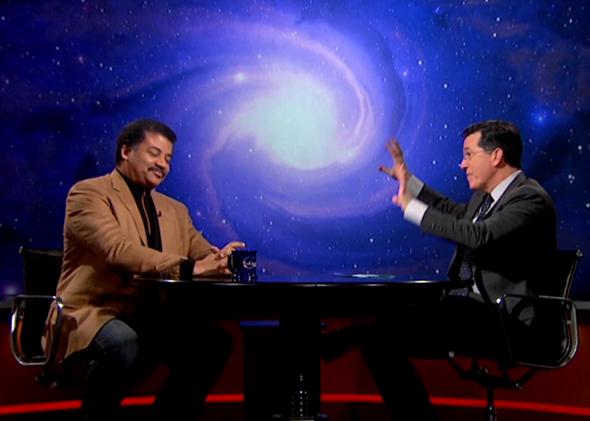David Letterman announced last week that he will soon be retiring from The Late Show after hosting for more than 30 years, and CBS has confirmed that Stephen Colbert will replace him. While switching from The Colbert Report to The Late Show will be a huge career advancement for the comedian and TV show host, it could be a big loss for television coverage of science.
Stephen Colbert is one of the only news or faux-news anchors to regularly cover scientific discoveries and interview scientists. “The Colbert Report has certainly been one of the best television programs ever for showcasing scientists—and I don’t just mean ‘for a comedy talk show,’” says science comedian Brian Malow. He points out that the guest who has made the most appearances is Neil deGrasse Tyson. “More than any movie star! And Tyson isn’t even the only physicist he’s featured!”
Among the other physicists Colbert has interviewed are Brian Greene, Michio Kaku, and Lawrence Krauss. He has hosted oceanographer Robert Ballard, neurophilosopher Patricia Churchland, surgeon Atul Gawande, and evolutionary biologist Neil Shubin as well as experts in science policy such as then–Environmental Protection Agency Administrator Lisa Jackson and National Institutes of Health Director Francis Collins. The online archive of interview guests includes separate categories for “academic,” “medical,” and “scientist.”
This could change when Colbert takes over The Late Show. As Mashable noted, “the Late Show gig would force him to shoot the breeze with all manner of celebrities.” During Letterman’s run, Late Show guests have typically been movie or TV stars. For example, this week’s guests include Tom Selleck, Zach Braff, Lindsay Lohan, Rob Lowe, and Jason Bateman. Colbert Report guests this week include mathematician Edward Frenkel and primatologist Jane Goodall.
Colbert’s transition comes at a terrible time for coverage of science. “Traditional science journalism has been gutted in recent years due to the economic downturn,” says Sheril Kirshenbaum, the co-author of Unscientific America: How Scientific Illiteracy Threatens Our Future. Paul Raeburn, chief media critic at the Knight Science Journalism at MIT Tracker, agrees. “Television news has jettisoned its science reporters in recent years, and when it does cover science it covers it like politics—who’s winning, who’s losing, and what does it all mean for the next election,” Raeburn said.
The consequences were clear most recently in CNN’s horrifically bad coverage of the missing Malaysia Airlines Flight MH370. CNN cut its science, technology, and environment team in 2008. When host Don Lemon was covering the lost plane, he speculated on air that there could be some supernatural explanation, or perhaps the airliner could have disappeared into a black hole.
Meanwhile, Animal Planet is airing fake documentaries about mermaids.
Print media isn’t much better off: A Pew Project for Excellence in Journalism study showed that almost 100 major newspapers had science sections a few decades ago, and only 35 did by 2008.
Colbert can’t cure public science illiteracy associated with declining news coverage, but by presenting scientific information to his huge audience in a fun and entertaining way, he has certainly helped. “Most Americans don’t know a scientist personally, so they get their impressions of who we are and what we do via television and film,” says Kirshenbaum.
“The show has implicitly included science and scientists as an everyday part of our culture—even pop culture,” Malow says. “By incorporating science so often into an entertainment program, I think it’s done something important that even our best science programs don’t do.”
Colbert features science in many of his show’s segments, not just in his interviews. Colbert’s recurring series “The Craziest F#?king Thing I’ve Ever Heard” is often about interesting new scientific discoveries. He has discussed neuroscience, insect reproduction, and the Large Hadron Collider. He put the scientific Journal of Paleolimnology “on notice” for proposing an explanation for walking on water that differed from the biblical account.
The Colbert Report covered a mishap in University of Maine Ph.D. student Skylar Bayer’s research in marine biology. A bucket of her samples—scallop gonads—was accidentally taken by someone else. A Colbert Report producer saw her blog post and thought it would make a fun segment for the show; they turned it into a mock crime drama. “They asked some standard questions like, what happened, why do you need scallop gonads, why is science important,” Bayer says. “They also asked a few crazy questions like, are you trying to take over the world, or are you playing God.”
Bayer saw how effective the Colbert Report’s method of explaining science was when she showed her segment to a class of high school students last year. “I asked them what they thought about scientists afterwards. They said I seemed pretty normal. I asked them if they learned anything about scallop reproduction. They said they got that it was important to the fishery. Getting some high-schoolers to get those two pieces of information out of a TV segment while laughing hysterically is a huge accomplishment.”
As a big fan of The Colbert Report, and as someone who drove 600 miles to attend the Rally to Restore Sanity and/or Fear in Washington, D.C., I wish Stephen Colbert the best as he prepares for this new phase in his career. I just hope that when it comes to covering scientific topics, CBS lets him keep up the good work.
